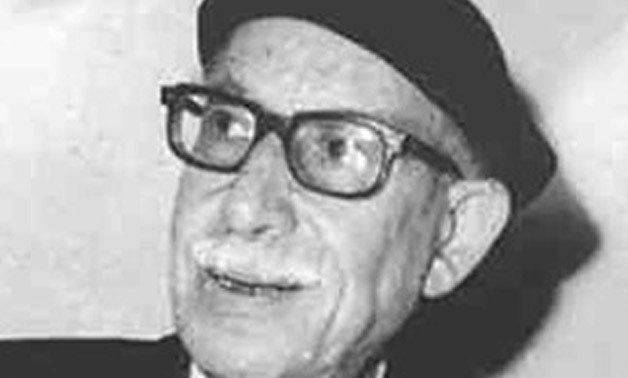
Tawfik el-Hakim - File Photo
CAIRO - 27 July 2017: Writing about Tawfik al-Hakim is almost an impossible task. His enormous production in plays, novels, poetry, journalism, opinion disagreement battles makes trying to understand his caliber a difficult mission.
He is the founder of contemporary Egyptian drama and a leading figure in modern Arabic Literature. He gained fame as a dramatist with the play Ahl Al-kahf in 1933, which is based on the biblical story of the Seven Sleepers of Ephesus, where he monitors the human struggle against time.
His style in play writing founded the cognitive theater, which is really hard to put on stage, but puts the whole play in the readers mind not the viewers. His boldest play was Mohamed in 1936, which is not intended for performance about the prophet of Islam.
Hakim comes from a well off family, studied law and went to France in a scholarship to get a PhD in his field, but once there; he was fascinated by the theater movement and studied it. He returned three years later with no degree, but with a job in the Ministry of Justice; his career in the government was not a long one, as he threw himself in the writing career.
His novel the return of the spirit published in1933 is an important stop in the modern Arabic literature; in that play, he paved the way for the hero, who would come to wake the nation and revive its conscious. This book was among the factors that inspired Nasser to do his coup in 1952. In 1958, Nasser gave Tawfik al-Hakim the Republic’s highest award considering him the Godfather of the revolution.
Hakim's writing style passed by three stages; when he was still not confident enough in his talent and borrowed many of the expressions from others then came the stage where his confidence grew, so was able to master the language to make it follow his thoughts and express deeper ideas and notions in his novels and plays.
Afterwards, his mastery evolved and manifested itself in his work when innovation and new ideas attacked social issues, political problems and inspiration from Egyptian heritage to deal with the society’s development and evolution.
Hakim acquired the title “Woman’s enemy” by the press; the reason was his attack on the feminist leader Hoda Shaarway criticizing her ideas in explaining that women are equal to men in everything and should not be living as slaves for their husbands or the male figures in their lives and her ideas led her followers to find the courage and stop cleaning and serving everybody in their houses; and this what made him attack the feminist movement vigorously.
Politically Hakim was a nationalist liberal but he never joined a political party or organization, he kept his independence and was enthusiastic for the military coup when it happened. Yet, he was critical of the dictatorial side of the military officers who executed the coup.
Among the anecdotes about Hakim's personality is his famous stinginess. He laughed about it when he heard it and denied it, but it was confirmed by those who knew him.
Hakim’s works were translated to various languages and had very strong impact on the readers that Naguib Mahfouz, the Nobel Prize winner, stated clearly that Tawfiq al-Hakim should have had it first.
Hakim went through many opinion debates and battles, the last of which when he wrote four articles entitled “Discourse with God” then modified it to message to and from God; where he imagined a debate or a long chat with God. The Islamic thinkers were angered accusing of considering himself as an equal to God to the point that he can have a discussion with the creator; this battle stopped only when the political authority ordered that it should be stopped before the anger got out of hand.
Hakim's books are still considered a reference in the human heritage.

Comments
Leave a Comment